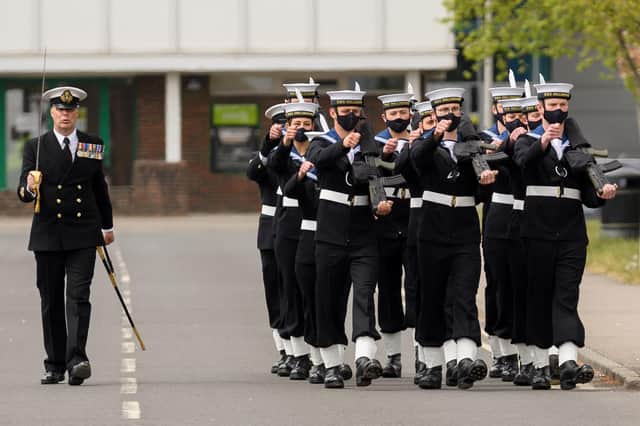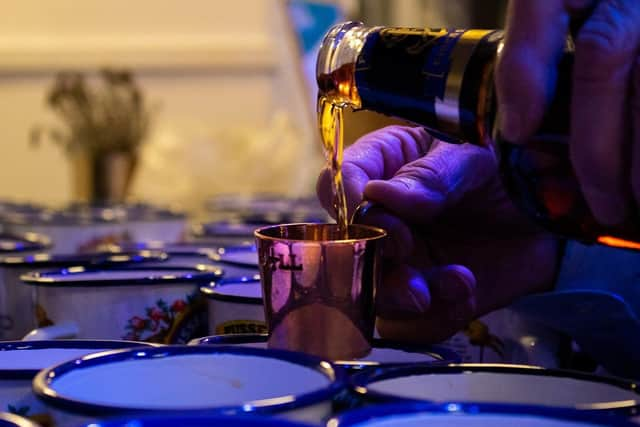Learn your Jackspeak with a rereleased dictionary of navy slang


And so it is the case with the senior service – the language of the Royal Navy is packed with arcane and obscure references which are impenetrable to outsiders.
But it is also surprising to learn just how many phrases have entered daily use which first emerged from sea-going life – from ‘chancing your arm’ to ‘chewing the fat’, ‘sailing close to the wind’, or even having a ‘square meal.’
Advertisement
Hide AdAdvertisement
Hide AdA Dictionary of Naval Slang, written by Gerald O’Driscoll, was first published in 1943. Republished last month some 78 years on it is both a fascinating time capsule and an enlightening insight into this colourful world of ‘Jackspeak’.


Featuring dozens upon dozens of definitions, from ‘abaft the screen’ to ‘Yank’, this tome is a valuable for anyone with an interest in navy life – fun to dip into, or to offer a window into how, where and why some of these expressions developed.
With Portsmouth being the home of the navy, it’s a book that is bound to be of interest to many in this region. It would make an ideal stocking filler for naval, history, language and military fans alike.
The new edition comes with a foreword by Richard Humphreys, the bestselling British writer and memoirist.
Advertisement
Hide AdAdvertisement
Hide AdBorn in Wolverhampton, he spent many years in the Royal Navy as a diver and submariner, including multiple patrols on the UK’s Polaris class nuclear submarines in the 1980s.


His experiences aboard Britain’s nuclear deterrent formed the basis of his hit memoir Under Pressure: Living Life and Avoiding Death on a Nuclear Submarine, published in 2019.
In this extract from his foreword, Richard recalls how he received an abrupt induction into navy slang from the moment he joined the service.
‘As the rest of the human race settled down to watch Live Aid, a lithe, spotty and nervous teenager gazed out from the Torpoint ferry across the sun-soaked millpond of the River Tamar, wondering what the next twelve weeks had in store.
Advertisement
Hide AdAdvertisement
Hide Ad‘I’d been told by various people to get as fit as possible for both the physical and mental tests that lay ahead; military basic training was going to be a full-on, intensive process.
‘What nobody had mentioned to me, though, was the trouble I’d have understanding what all the Chief Petty Officers (mostly old salty sea dogs) with years of experience behind them were talking about!
‘Since the days of yore, the Royal Navy has had its own language, or ‘Jackspeak’, that has, over the last four centuries, come into everyday use for the senior service.
‘My first introduction to this was on my first day in the RN, when a bespectacled barber and ex-Navy man had shaved my head to within half an inch of its life before shaking my hand and saying, “Welcome to the Andrew.”
‘I misunderstood him.
‘"Hi Andrew, I’m Richard, nice to meet you,” I replied.
Advertisement
Hide AdAdvertisement
Hide Ad‘A torrent of abuse was hurled at me from my left as an enraged Chief Petty Officer with a face the colour of beetroot informed me that "the Andrew” was actually the term for the Royal Navy.
‘Pusser is another term that can be used to describe the whole of the Navy; it derives from the paymaster and supplies officer of the Navy of old, in other words the bloke who paid you.
‘I still got paid cash in hand when I first joined – the Pusser would deliver the cash into my left hand as I saluted and failed to remember my service number, which I had to shout back at him at the same time.
‘There are conflicting reports as to the origin of the term “the Andrew”. Some say it derived from the Christian names of two notorious press-gangers from the Napoleonic and the Age of Sail eras.
Advertisement
Hide AdAdvertisement
Hide Ad‘The most likely explanation, however (and one which O’Driscoll subscribes to), is that the first edible rations on the Royal Navy men-of-war were supplied by a company run by one Andrew Miller, who had such a monopoly on supplies that in many ways he owned the Navy.
‘The phrase stuck.
‘The rest of my time in basic training I was referred to as a Nozzer, which was a term given to new sailors until they passed out. The term came from an old instructor from some years past who had been well endowed in the nose department!’
The dictionary’s definitions cover many areas from food (‘Action Man’s pillows’ are ravioli, ‘Nelson's blood’ is rum) to everyday life – or every day life at the time it was written, at least (a ‘clampy’ is the owner of large feet, while a ‘tin eye' is a monocle) and the minutiae of navy activity.
Here are just a few more from the book:
* dodging Pompey: Shirking work; skulking. Origin is said to be associated with the insurgents of Spartacus who, after a heavy defeat, were fleeing from Pompey, the Roman general.
Advertisement
Hide AdAdvertisement
Hide Ad* Goon: Sometime before the Second World War, because of their somewhat weedy appearance, the youths in training at Exmouth Block RN Barracks, Devonport, were nicknamed ‘goons’, and Exmouth Block became popular as ‘Goon Valley.’
* Lady Godiva bloke: A term of derision applied to one who is over-fastidious as to the appearance of his hair, teeth or fingernails.
* Rum fiend: As the term implies, a man who is a glutton for rum; also the hard-featured toper who presides at the ‘fanny’ and serves out ‘shaky’ tots in order to insure more ‘plussers’ for himself.
Extracted with permission from Swift Press.
A writer who knew a good one-beller*
Gerald O’Driscoll (1886–1947) was an Irish sailor, journalist and humourist who also wrote under the pen-name ‘Geraldus’.
Advertisement
Hide AdAdvertisement
Hide AdBorn in Cork, he joined the Royal Navy as a boy and had a long and successful career.
He served during the First World War on HMS Temeraire, which saw action at the Battle of Jutland.
After leaving service he wrote several bestselling books memorialising the sailor’s world, including The Musings of a Merry Matloe, subtitled ‘A Book of Naval Humour’ (1927) and Awful Disclosures of a Bluejacket (1929), now sadly out of print.
A Dictionary of Naval Slang, his last book, was published in 1943 at the height of the Second World War.
*one-beller = story, yarn
Advertisement
Hide AdAdvertisement
Hide AdA Dictionary of Naval Slang by Gerald O’Driscoll, published by Swift Press, is available now in hardback from all good booksellers, priced £8.99.
A message from the Editor, Mark Waldron
You can subscribe here for unlimited access to our online coverage, including Pompey, for 26p a day.